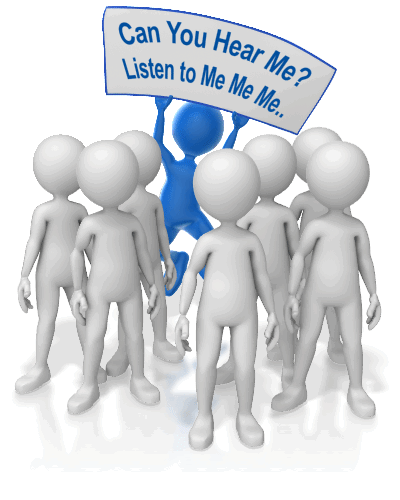The question in my previous post generated quite a few responses…here on this blog, as well as, on my Facebook page.
Everyone got the sequence in the correct order. Hearing precedes listening. Technically speaking, hearing is the first part of listening. Some folks confessed their “sin” of deliberately not listening, while others reflected on their poor listening habits and endeavored to do better. Actually, very few of us are “good” listeners. But does that make it less important? Absolutely not!
“Listen, Can you hear it?” There’s that familiar sound, next door. The teenager is fighting with her mom, again. “I heard what you said the first time, Julie. The answer is still, ‘NO!'”
Julie retorts, “You NEVER listen to me!”
In many houses across this nation…perhaps, around the globe, a version of this drama unfolds, almost every day. Let’s take a look at the processes referred to here.
Hearing, the first part of listening, is passive. You don’t have to do anything to hear. It depends on the integrity of the physical organ, the ear, and your entire body. Did you know that you experience (hear) sound with your whole body? Ask a deaf musician, he’ll tell you about it.
The second part of hearing is electric. That’s when your body’s mechanism takes the physical sound and turns it into a signal that can be picked up and interpreted by your brain cells.
Listening is actually the third part of the process. It involves mental engagement. According to sound scientists, that involves:
- Extracting information, e.g. pattern recognition that allows you to hear your name called in a noisy restaurant.
- Differencing, e.g. ceasing to hear a constant, annoying sound after a few minutes.
- Filtering (this is where it gets messy), e.g. your culture, language, values, beliefs, attitudes, expectations, intention.
Your filters determine whether you internalize certain things or not. In any instance, your conversational intention can actually change what you hear and grasp. Julie was really telling her mom that her attitude showed they did not value or believe the same things.
When children perceive you are listening…that they are being heard, great change can be effected…excellent results can be achieved.
John Bentley calls listening a doorway to understanding, bridge to connecting and a foundation of trust, among other things. I like walking through doorways that lead to pleasant places, don’t you?
Question: What is one specific action you will take to become a better listener?


I think to many people are distracted in this technology age and are trying to “multitask” and so don’t really listen that well. You need to give somebody 100% of your attention to listen properly.
Yes, Andy, when our attention is divided, it is difficult to really listen.
I agree wholeheartedly. My 4 year old tells me all the time, “I didn’t hear you mommy”. My answer is always, “Yes you did. You just weren’t listening.” I get so many weird looks when people hear me say that. 🙂
I also agree that it depends on how well you are listening as to what you comprehend. Regrettably, my S.O. and I have the same fight as Julie and her mother quite frequently. Just because you hear what someone says and can repeat it back to them does not mean you really HEAR what they are saying. You hear the words, not the meaning.
You got it, Traci. So now that it is brought into your conscious thought, what action do you plan to take so you can connect better with your children and others with whom you interact?
Great post. I agree with your statement that listening is a doorway to understanding and a bridge to connecting. For me, filtering is something I am continuously improving. In this day and age of multi-tasking and technology gadgets, I think listening is something everyone needs to do more of.
You’re so right, Tandy. Today, in our microwave-minded communities, we are too impatient to listen so we spend our “listening” time picking out sound bites to respond to and figuring out ways to make our own points, rather than truly trying to understand what the other person is saying. And with the addition of texting and instant messaging, we hardly have time for real connecting.
As a matter of fact, I listen very well because I’m hard of hearing with hearing aids. I know I need to be close enough to see the person speak so I can read their lips to complete the process.
Good for you, Deseree! So just as the negative (photography film) is turned into a positive (beautiful photograph), your hearing loss has turned you into a diligent listener. 🙂